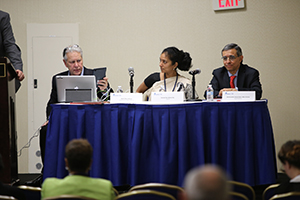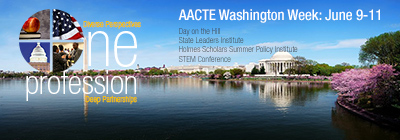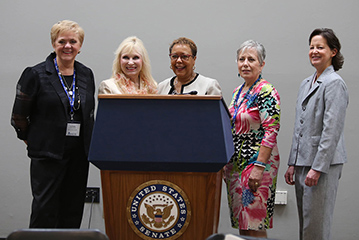06 Jul2015
By Evelyn Perry
I want to congratulate the organizers of the recent Mid-Atlantic edTPA Implementation Conference at Towson University (MD) for doing something that should be standard at educator preparation conferences: They included PK-12 partners in the conversation and created a high-profile opportunity for them to tell their stories. To accomplish this goal, the National Education Association worked with conference organizers to set up a panel discussion, inviting teacher candidates and teachers to participate and asking me to facilitate.
The conversation at the conference provided authentic educator perspectives on recent experiences with edTPA. Here are my five top takeaways from the conversation.
26 Jun2015
By Jerrica Thurman
AACTE issued a press release June 24 announcing a new Clinical Practice Commission, which has already begun working on an ambitious agenda to better define what constitutes high-quality clinical teacher preparation. Read on to learn more, or contact Vice President Rodrick Lucero, who chairs the commission, for more information.
23 Jun2015
By Kristin McCabe
A new partnership between the Woodrow Wilson Foundation and the Massachusetts Institute of Technology (MIT) launched last week to “transform policy and practice” in educator preparation. Announced June 16, the new Woodrow Wilson Academy of Teaching and Learning will be a graduate school of education based at MIT that conducts research and offers competency-based master’s programs in teaching and school leadership.
Foundation President Arthur Levine, former president of Teachers College at Columbia University (NY), touted the academy’s plan to “throw out the clock”—focusing on its students’ mastery of competencies rather than on credit hours—and to produce open-source course modules for ease of replication nationwide.
23 Jun2015
By Kristin McCabe
The U.S. Department of Education invites applications for Skills for Success grants to support local education agencies and their partners, including colleges and universities, in developing the noncognitive skills of middle-grades students.
According to the Department’s web site, up to $2 million is available to fund “the implementation, evaluation, and refinement of existing tools and approaches (e.g., digital games, growth mindset classroom activities, experiential learning opportunities) that integrate the development of students’ noncognitive skills into classroom-level activities and existing strategies designed to improve schools.”
16 Jun2015
By Michelle Kotek
AACTE’s Washington Week kicked off with diverse perspectives, enlightening anecdotes, and compelling conversations at the special conference “Progress and Factors That Contribute to Closing the STEM Achievement Gap,” sponsored by the National Science Foundation. Five presenters joined AACTE leaders on two panels discussing ways to improve learning outcomes of underrepresented populations in the STEM fields.

Hall Davidson, Vasanta Akondy, and Armando Sanchez-Martinez at STEM Conference
The conference began with presenters Armando Sanchez-Martinez, manager of Editorial Santillana in Mexico, and Vasanta Akondy, co-manager of the Verizon Innovative Learning Program (VILP), who together provided a global perspective on innovative solutions to increase access to STEM education in Mexico and India.
Sanchez-Martinez presented a comprehensive look into Mexico’s educational landscape, including a detailed explanation of sociocultural factors that contribute to local achievement gaps and of the current educational movements and solutions to closing the gap. Akondy highlighted the importance of VILP and its efforts to recruit more girls in India into the STEM fields. The aim of this program is to provide a community network of support while focusing on student engagement and providing technological resources to underfunded schools.
16 Jun2015
By Jerrica Thurman

Throughout AACTE’s Washington Week, June 9-11, the theme “Diverse Perspectives, Deep Partnerships, One Profession” permeated each event, motivating attendees to forge and nurture bonds that will strengthen the profession. From the emerging leaders attending the Holmes Scholars Summer Policy Institute to the chapter executives at the State Leaders Institute, and from the STEM conference through Day on the Hill, participants connected with peers, policy makers, and partners around common goals and interests.
15 Jun2015
By Melanie Agnew and Reid Riggle
To quote Valerie Strauss in the May 28 edition of The Washington Post, “What the heck is going on with Wisconsin public education?” Efforts in the Wisconsin State Legislature to reform education without the transparency of public debate, or the consultation of educators, resulted in proposed legislation that may erode the basic foundation of Wisconsin’s public school system. Do politicians realize they are proposing a licensure policy that, if approved, would require barbers (yes, you read that right) to have more training at their craft than teachers?
Seriously, what the heck IS going on?
09 Jun2015
By Sharon Robinson
Professional advocacy organizations support their members by helping them advance a collective voice. By articulating a field’s consensus positions, associations empower their members to speak clearly about what they know, identify priorities, invest their energy strategically, and communicate confidently with internal and external audiences.
These unified understandings, which we adjust as research and best practices evolve, help us fulfill our obligation to correct misinformation and to respond to critics—a frequent need in the field of educator preparation. More importantly, though, they provide a foundation for action by the profession and help us recognize areas of need. In educator preparation, we’ve instituted a variety of reforms in recent years that have prompted us to develop new resources to increase our capacity, assess our progress, and inform our knowledge base.
01 Jun2015
By Linda McKee

Educator preparation faculty at Nazareth College in Rochester, NY, like to meet with faculty in other departments to compare notes about how their teacher candidates are doing and how best to support them across study areas.
“That’s just the environment we work in. They are all of our students, as they major in education and an area of the liberal arts and sciences,” explains Kate DaBoll-Lavoie, professor and immediate past chair of the Department of Inclusive Childhood Education at Nazareth. “We want them to succeed. We support our colleagues.”
For the past 2 years, DaBoll-Lavoie and her colleagues have brought to the table new data that have enriched the conversations and helped to focus them on specific needs of students.
05 May2015
By Donna Sacco
At last month’s conference of the American Educational Research Association, I attended a joint business meeting of two special interest groups—Professional Development School Research and Supervision and Instructional Leadership—focused on the role of supervision of instruction in professional development schools (PDSs) from preservice to retirement. Panelists included AACTE’s Linda McKee, senior director of performance measurement and assessment policy; Daisy Arredondo-Rucinski, University of Alabama; and Bernard Badiali, Pennsylvania State University.
04 May2015
By Jerrica Thurman

AACTE joins the National Education Association (NEA) and the National Parent Teacher Association (PTA) in celebrating terrific teachers during National Teacher Appreciation Week, May 4-8, and National Teacher Day, May 5.
“Teachers work every day to meet the needs of our students, often in the face of significant challenges,” said AACTE President/CEO Sharon P. Robinson. “We are so grateful for their dedication.”
01 May2015
By Mark Ginsberg
I am honored to assume the role of chair of AACTE’s Board of Directors at such an exciting time for the organization and the profession as a whole. Nine weeks into my yearlong term, I’m eager to share my excitement with you about the work we’re doing together.
Most visible so far is our focus on accreditation, particularly our efforts to initiate a collaborative dialogue with the Council for the Accreditation of Educator Preparation (CAEP). This dialogue aims to address concerns expressed by many AACTE members while continuing our support for CAEP as the field’s unified accrediting body.
Although important—in fact, critical—for our field, our work with CAEP is but one of a large portfolio of topics on AACTE’s agenda.
28 Apr2015
By Jerrica Thurman

Participants in Day on the Hill join Sharon Robinson during Washington Week
Every year, AACTE’s Washington Week attracts hundreds from around the nation. Read these testimonials from recent participants about the value of attending:
20 Apr2015
By AACTE
AACTE applauds the leadership of U.S. Senate HELP Committee Chairman Lamar Alexander (R-TN) and Ranking Member Patty Murray (D-WA) on the unanimous, bipartisan passage of the Every Child Achieves Act of 2015 (ECA). AACTE is pleased with the committee’s progress on the long overdue reauthorization of the Elementary and Secondary Education Act (ESEA).
The bill moves away from the "test and punish" strategy that evolved from the implementation of the current version of ESEA, known as the No Child Left Behind Act of 2001. While the bill retains the requirement for annual assessments disaggregated by subgroups, it leaves states, schools, teachers, and parents to determine what to do about the results of those assessments. AACTE believes students would benefit from stronger accountability for subgroup results, but overall, the bill makes important bipartisan progress toward fixing a broken law.
06 Apr2015
By Sharon Robinson
News Flash! The interest of students and their opportunity to learn is not better or even well served by a strategy of constant and high demand of inexperienced teachers. Retention matters, not just to teachers but, most critically, to students.
Recent studies showing that teacher effectiveness continues to develop over time reinforce this imperative to do right by our students. First, in a working paper completed last year for the National Center for Analysis of Longitudinal Data in Education Research, researchers at Duke University found that middle school teachers’ effect on student test scores as well as attendance rates improves over at least several years. A subsequent study out of Brown University found improvement in teacher effectiveness is indeed steepest in the early years in the classroom but continues for many more years, challenging the common perception that teacher quality is a fixed characteristic after just a couple of years of experience.











